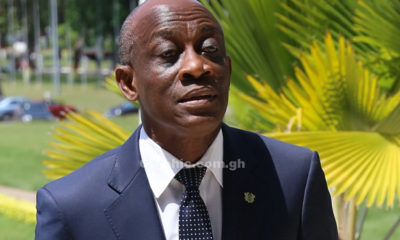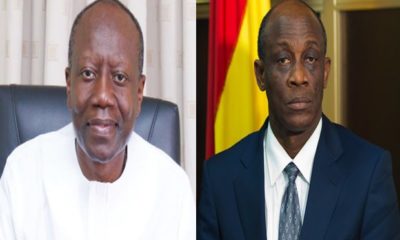Published
8 months agoon
By
Adubianews
Economic Policy Advisor to the Vice President, Sharif Mahmud Khalid, has acknowledged that Ghana’s recent credit ratings upgrade by Fitch is not the result of structural reforms or economic transformation, but rather the outcome of the controversial Domestic Debt Exchange Programme (DDEP).
Speaking on PM Express on Wednesday, June 17, after Fitch upgraded Ghana’s rating from ‘Restricted Default’ to ‘B-’ with a stable outlook, Dr Khalid made a candid admission regarding the true drivers behind the improved external outlook.
“If you look at these ratings,” he said, “when we took office, remember that Prof [Bokpin] mentioned that we started to make some gains thanks to the Domestic Debt Exchange Programme.”
He emphasized that the DDEP had indeed yielded some benefits, which played a key role in influencing the positive rating. “Because the DDEP did give some gains, and obviously that would have an impact on any ratings that are to come externally.”
This position diverges from other narratives that attribute the upgrade to fiscal discipline and structural reforms. Instead, Dr Khalid pointed out that the ratings improvement is largely “artificial,” driven by the debt restructuring process rather than any lasting economic fixes.
“What it means is that artificially, there would be some gains thanks to a Domestic Debt Exchange Programme,” he reiterated.
He explained that the reactivation of Ghana’s sinking fund served as a positive signal to creditors, indicating a commitment to servicing debt obligations. “If you’ve activated a sinking fund, which is an insurance measure to service most of these, and then you’ve committed to both external and domestic debt programs, invariably, it’s going to improve.”
According to Dr Khalid, the upgraded B-rating reflects reduced risk of default, rather than internal economic stability or transformation. “In the language of rating agencies, it means you’ve improved in terms of your risk of defaulting on a debt payment.”
He further clarified that the move is aimed more at external perception than domestic economic impact. “This is not for the internal market,” he said. “This is for the external market, which we are not ready as of yet to even start pushing through, because we believe in stabilising the domestic market.”
On the issue of fiscal discipline, Dr Khalid was measured. While acknowledging efforts like reducing appointments and controlling spending, he noted that market perceptions often react to budget projections rather than actual disbursements.
“Once the budget is read, the market responds to the budget, whether you spend a penny or not. Because the market knows what you’re going to spend.”
When asked if the government is becoming “bullish,” he avoided the label, stressing instead that the improved ratings stem from demonstrated financial commitments, not necessarily from reforms already implemented. “It’s the government’s own commitment, initiative, and program,” he concluded.
Kwabena Agyapong fluffs,says NDC are better managers of the economy than NPP


Deception, huge consumption spending killing Ghana’s economy – Terkper


Dep. Governor: Ghana’s economy to recover faster than expected


I moved Ghana’s economy from 41.6b to 54.5b in 4yrs – Mahama


NDC manages economy better than NPP – ASEPA

Locking down the country now a sensible move – Economic Fighters League


Congress rolls out ‘Better Deal,’ new economic agenda

























